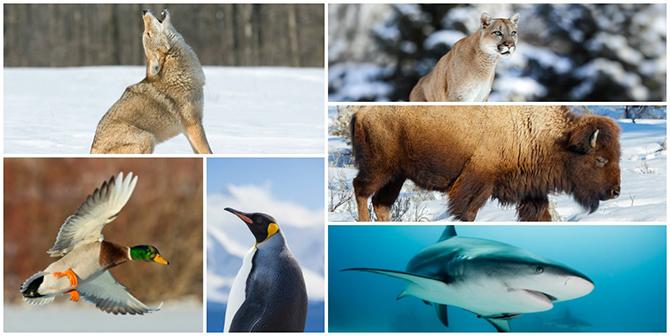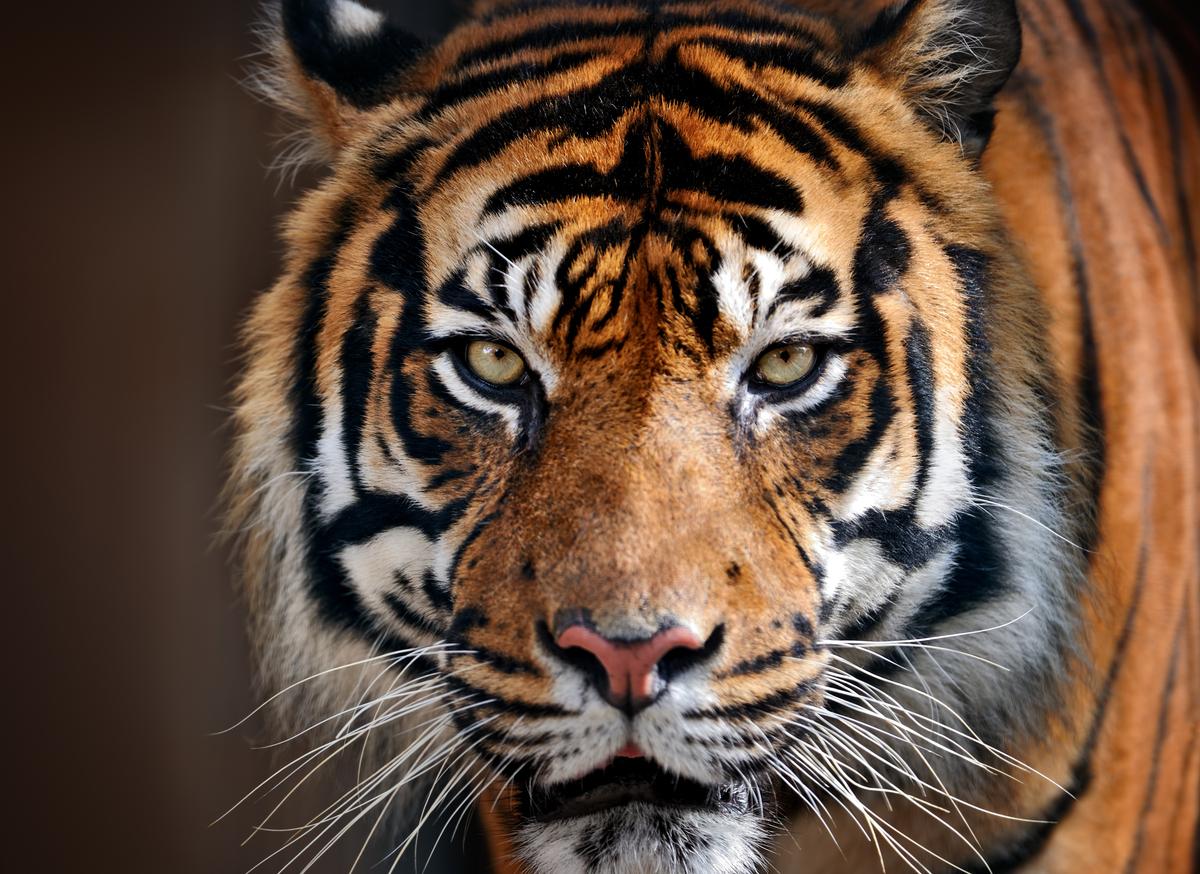Animal Team Names in Ice Hockey
From the NHL all the way to Europe

Whether it's the Pittsburgh Penguins of the famous National Hockey League or the Cologne Sharks of the German Ice Hockey League - ice hockey teams all over the world are often named after animals. We have examined why this is and where the names actually come from. All the answers and even more facts about this exciting topic can be found here.
When looking at hockey game schedules, do you often feel like you stepped into a zoo? We have, so we asked an expert. We will tell you the histories of the animal team names of the NHL teams and get to the bottom of the worldwide trend.
Michael Krein with his blog "Kr1 Eishockeyblog"
On his blog "Kr1 Eishockeyblog- Die brotlose Eishockey-Kunst" Michael Krein reports passionately about current events, relevant backgrounds and exclusive insider stories of the world of ice hockey.

How did it get started?
Originally, the tradition of having an animal companion in the team name comes from North American sports leagues. Thus not only ice hockey teams, but also teams in American soccer, baseball and basketball have an animal in their name. Michael Krein explains how this tradition has become part of ice hockey:
"There are two aspects: On the one hand, the animal is part of the coat of arms of the city and was already integrated into the logo at club's inception. Then later, towards the end of the 1990s, the clubs, inspired by American role models, started to increasingly identify themselves with mostly aggressive animal logos. Another reason for that were marketing aspects, in order to sell more merchandise.
One of the first teams worldwide were the Quebec Bulldogs, founded in 1910, who even had a bulldog on their team photo. The tradition of animal names comes from the English-speaking countries, where even Australia is one of the trendsetters shortly after the turn of the century".
For example, logos are printed on merchandise as part of the marketing campaign and the namesake animal is brought to life as a mascot.

Animal names of the NHL
The US-based National Hockey League (NHL) currently consists of 31 teams, six of which bear an animal name.
"At the beginning of the 1990s, the San Jose Sharks and the Mighty Ducks of Anaheim triggered a real marketing boom. Previously, the Pittsburgh Penguins and the Hartford Whalers had been alone for a long time," blogger Michael Krein explains the beginnings of the animal teams. However, the Hartford Whalers were only part of the NHL from 1979 to 1997. Here, we will tell you where the animal names of the six current NHL teams come from.
Pittsburgh Penguins
The "Pittsburgh Penguins" joined the NHL in 1967. Carol McGregor, wife of one of the part-owners, came up with the name more or less by chance.
It was already known that the team would be playing their home games in the Civic Arena, so she asked what the arena was colloquially called. Since the venue was often nicknamed "The Great Igloo", it was obvious to give the team the animal nickname "Penguins". On the original logo there is a penguin in front of a triangle that stands for "The Golden Triangle" of downtown Pittsburgh.

Buffalo Sabres
The "Buffalo Sabres" were founded in 1970. Their logo shows a bison and two crossed sabres. First, the team comes from Buffalo, New York, and was originally meant to be called the "Bisons" (Buffalo).
The owners, brothers Seymour Knox III and Northrup Knox, wanted to find a more original and unique team name and started a competition to find a name. From numerous submissions they finally chose "Sabres". The brothers based their decision on the fact that the sabre was carried as a weapon by a leader and was strong in both offense and defense. This is exactly what they hoped for from their team.
Arizona Coyotes
The "Arizona Coyotes" were originally founded under the name "Winnipeg Jets" in 1972. For the 1996/97 season they moved to Phoenix, where they held a competition to give the team a new name. The coyote, the most feared predator in Arizona, prevailed. By the way, "Scorpion" came in second.
At first the team was called "Phoenix Coyotes" until they moved again, this time to Glendale, a suburb of Phoenix. At the beginning of the 2014/15 season, they renamed to"Arizona Coyotes" because they didn't want to be seen only as an ice hockey team for Glendale or Phoenix, but for the whole state of Arizona. So the team hoped to get fans from all over the southwest excited.
Anaheim Ducks
The "Anaheim Ducks" are the only team named after a brand in the history of the North American professional leagues. In 1992 Walt Disney landed a megahit with the movie "Mighty Ducks - The Superteam". In order to realize this, Disney founded a professional ice hockey team.
The following year, the NHL recognised the film's popularity by signing a franchise agreement with Disney. So the club was named "Mighty Ducks of Anaheim" and got the same logo from the movie. When Disney sold the team in 2005, the name was simply changed to "Anaheim Ducks".
San Jose Sharks
The "San Jose Sharks" were founded in 1991 and organized a drawing competition to win tickets for the Chicago game that same year. The primary purpose of this competition was to name the team.
The name "Sharks" finally won from over 2,300 entries from all over the world. Other suggestions included "Rubber Puckies", "Screaming Squids", "Salty Dogs" and "Blades". "Blades" was the most popular proposal, but was finally rejected because it could be understood as a gang reference. When the team name was chosen, it was fitting that seven shark species found their home in the Pacific Ocean along the Californian coast at that time. The area is called "The Red Triangle".
Florida Panthers
The Florida Panthers were founded in 1993. At that time, the Florida native wildcat was considered an endangered animal species. The team wanted to draw attention to the acute problem and named itself after the graceful wild cat.
When Chairman Bill Torrey revealed the team name, he told journalists his prediction that hockey players would do the Panthers justice by being as fast as the animal in its natural environment.
A global trend - Switzerland and Germany under the microscope
Not only in America are the animal hockey teams at home, also in Europe, animal names are very popular. We will show you how teams in Switzerland and Germany began naming teams after animals.
Switzerland
Switzerland's first ice hockey league, the NLA, consists of a total of twelve teams. Five of them show an animal in their logo. Michael Krein looks back on the history of Swiss ice hockey and uses the SCL Tigers as an example:
"In the 1970s, advertising on jerseys was banned in Switzerland. Because the SC Langnau (now known as SCL Tigers) had a tiger as a club symbol in the past, the club was allowed to put a tiger on their jerseys despite the advertising ban. "Coincidentally" it took the form of the tiger head of their sponsor "Tiger Käse AG". Since then the Langnauer are "tigers".
However, this did not remain without consequences, Langnau was not shown on Swiss television for two years and is regarded as a trendsetter in jersey advertising. The management of the club dared something unbelievable by the standards of the time."
Here as well the animal is in the name and is used for marketing purposes and the appearance of the team. Michael Krein provides an apt example:
"The HC Geneva Servette in Switzerland lets a real eagle, "Sherkan", fly through the stadium from the grandstand to centre ice before every game. Meanwhile, the players are on the ice in an eagle formation for the player presentation."
Although the team does not have an eagle in its official logo, it is mainly known for its feathered mascot.
How the trend came to Germany
The German ice hockey teams are also very much oriented towards the USA when it comes to names. The blogger explains this rather sudden turnaround:
"With the introduction of the German Ice Hockey League (DEL) in 1994, Germany was literally overrun by the animal wave. Out of 18 teams eleven changed their traditional club names to an animal name and three teams followed suit later on. The trend is to go back to the original names".
Even before the DEL, the animal nicknames of the ice hockey teams were able to assert themselves successfully. Michael Krein gives an apt example for this as well:
"One of the first and best known European teams are the Kölner Haie (EC), which bore the name "Haie" only as a nickname until the foundation of the DEL, but nevertheless the name "Haie" had been on everyone's lips for a long time.
The most popular animal in ice hockey - the tiger
Despite the huge variety of species in the animal world, ice hockey teams have their favourites when it comes to naming the team. Michael Krein sees the tiger as a great namesake:
"Tigers are very common especially in Europe. The DEL is home to the Nuremberg Ice Tigers and the Straubing Tigers. There are also tigers in the WHL in Western Canada (Medicine Hat), in the QMJHL in Quebec (Victoriaville), in the AHL in North America (Bridgeport), in Switzerland (SCL Tigers), in Russia (Khabarovsk), in the Czech Republic (Liberec) and in Belgium (Brussels, Turnhout). Tigers have also played in the NHL (Hamilton), the Netherlands (Amsterdam), Great Britain (Brighton, Dundee, Telford and Wightlink), Norway (Asker), the OPJHL in Ontario (Aurora), the former CHL in the USA (Cincinatti) and the former MAHL in the USA (Sands Points).

Maybe you also want to name your ice hockey team after the biggest cat of prey in the world?
On our website you can design an ice hockey jersey that is completely your own! Thanks to a variety of designs and colours, you can create a jersey that perfectly matches your team name. In addition, all logos, emblems and sponsor logos are already included in the price.
We hope we were able to guide you through the jungle that is the world of ice hockey and maybe even give you inspiration for your own team name!
Pictures: Title picture: ©iStockShaneGross, ©iStockEvgeny555, ©iStock Grafissimo, ©iStock KenCanning, © iStock JohnhPitcher, © iStock SteveOehlenschlager, Picture 1: © iStock Lunja , Picture 2: © Michael Krein, Picture 3: © iStock sdominick, picture 4: ©iStock Freder;